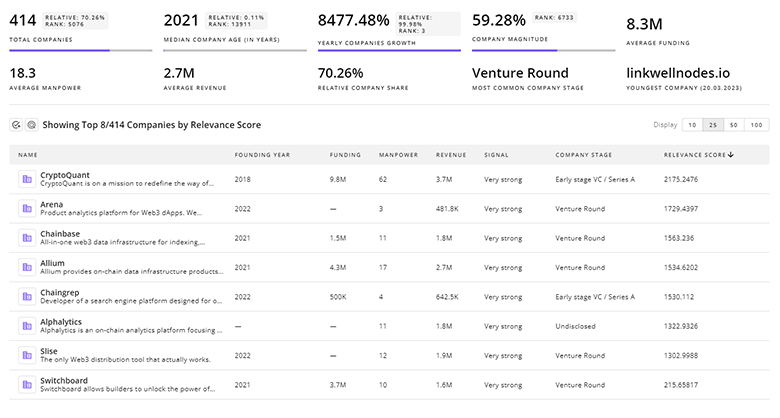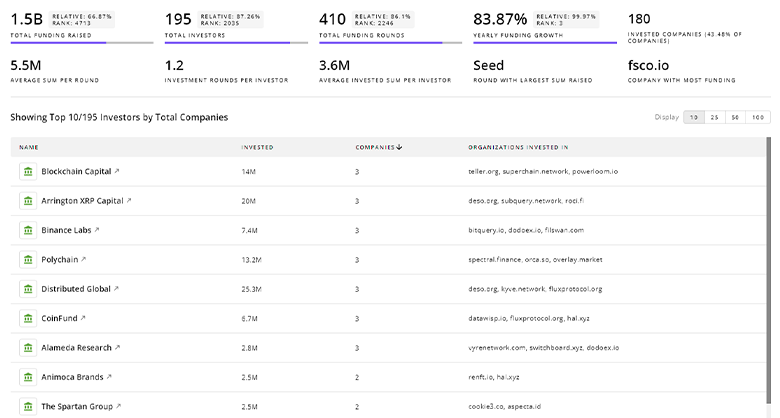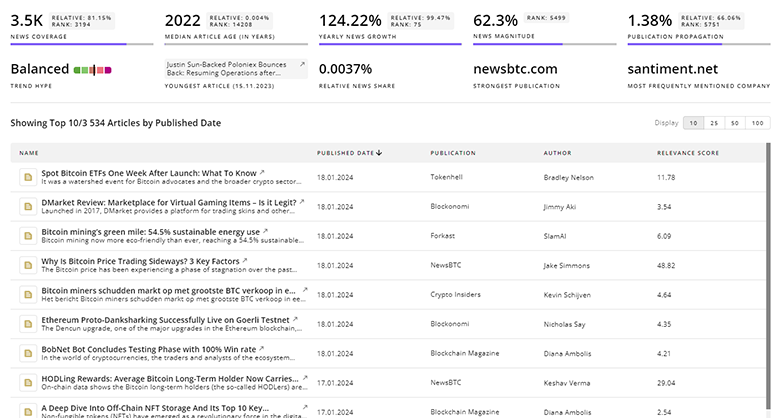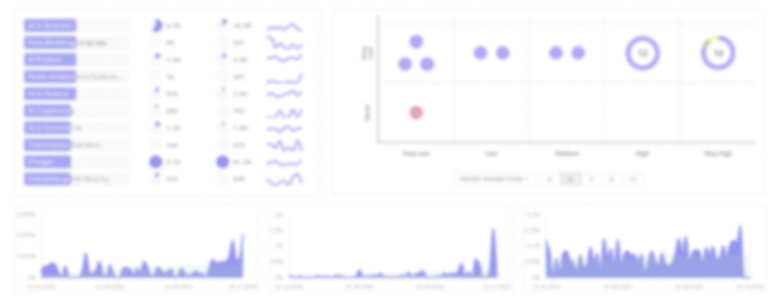
Small Molecule Inhibitor Report
: Analysis on the Market, Trends, and TechnologiesThe small molecule inhibitor market sits at a high commercial and innovation inflection point, with the internal trend data reporting a 2024 market size of USD 194.7 billion and a 5.8% CAGR projection, reflecting sizeable near-term revenue opportunity tied to expanding therapeutic applications and API scale-up demand.
95 days ago, we last updated this report. Notice something that’s not right? Let’s fix it together.
Topic Dominance Index of Small Molecule Inhibitor
To gauge the influence of Small Molecule Inhibitor within the technological landscape, the Dominance Index analyzes trends from published articles, newly established companies, and global search activity
Key Activities and Applications
- Targeted protein degradation, including molecular glues and PROTAC-style approaches, applied to proteins previously considered undruggable; this activity maps directly to new small-molecule modalities moving into preclinical pipelines SK Life Science Labs.
- AI-driven discovery workflows for hit identification, de novo molecule generation, and ADMET prediction, used to shorten timelines and prioritize higher-probability leads Molecule AI, Inventum.AI.
- Precision oncology and kinase inhibition programs that combine selective small molecules with biomarker stratification to manage resistance and toxicity in solid and hematologic tumors MEKanistic Therapeutics, NeoTargets AB.
- RNA-targeting small molecules and modulators of RNA processing, expanding the target space beyond proteins to noncoding and regulatory RNAs in oncology and neurology Rgenta Therapeutics Inc., Serna Bio.
- Commercial and clinical API production growth to support increased small-molecule approvals and outsourced manufacturing needs, driving CDMO capacity investments and M&A in API supply chains Small Molecule API market analysis (web).
Emergent Trends and Core Insights
- AI plus physics-aware modeling is becoming the differentiator for hit quality and translational predictability, with dataset-free and MD-coupled generative models now in commercial pilot collaborations.
- Investment is shifting toward platforms that enable targeting of "undruggable" classes, including intrinsically disordered proteins and RNA, because these platforms materially expand addressable patient populations and create higher value assets Interdict Bio.
- Commercial demand signals: small molecules drive the majority of recent drug approvals and CDMO throughput, creating a sustained need for API scale-up and regulatory compliance spending by manufacturers Small Molecule approvals & CDMO trends (web), Market synthesis (web).
- Therapeutic breadth expands beyond oncology into inflammation, metabolic and neurodegenerative indications as companies deploy selective allosteric and covalent strategies to improve therapeutic windows researchandmarkets: epigenetics report (web).
- NH-stage niche targets (for example RIPK1 in inflammation) illustrate how targeted small molecules can create new clinical segments when industry players progress candidates into the clinic GenFleet / RIPK1 reporting (web).
Technologies and Methodologies
- AI and generative models coupled with molecular dynamics for conformational sampling, enabling design against multiple target states rather than a single static structure Cortex Discovery.
- Chemoproteomics and photoaffinity profiling to find ligandable pockets across proteomes and to connect on-target engagement to cellular responses Belharra Therapeutics.
- DNA-encoded libraries and DEL+AI integration to screen very large chemical spaces with lower experimental cost per hit.
- Structure-based drug design, cryo-EM and ensemble structural techniques to expose transient binding sites critical for allosteric or multi-state inhibitors BIMOVIS structural services.
- High-throughput virtual screening and targeted experimental HTS funnels, combined with ADMET predictive modules, to move hits toward lead optimization faster.
- NanoBRET and live-cell profiling for cellular target engagement and selectivity assessment, supporting translational candidate selection.
Small Molecule Inhibitor Funding
A total of 282 Small Molecule Inhibitor companies have received funding.
Overall, Small Molecule Inhibitor companies have raised $91.3B.
Companies within the Small Molecule Inhibitor domain have secured capital from 1.5K funding rounds.
The chart shows the funding trendline of Small Molecule Inhibitor companies over the last 5 years
Small Molecule Inhibitor Companies
- Degron Therapeutics — Degron pursues small-molecule molecular glue degraders to address proteins inaccessible to classical inhibition; the company combines focused chemistry with selectivity profiling and has raised early-stage capital to progress discovery programs into the clinic.
- Deep Apple Therapeutics — Deep Apple integrates ensemble cryo-EM, large-library docking and deep learning to discover small molecules that engage dynamic receptor states; the platform is optimized for inflammatory and metabolic targets and emphasizes structure-based candidates with improved PK profiles.
- Enlace Bio — Enlace offers AI-powered virtual screening that models protein-ligand complexes directly from sequence, enabling hit discovery for novel protein targets lacking prior structural information; their service model accelerates early hit identification for small-molecule programs.
- NEBULA — NEBULA provides a physics-based, dataset-free genAI platform that generates target conformational ensembles and predicts ligand binding across states, addressing failure modes in pure data-driven approaches and improving hit prioritization for difficult targets.
- Ambagon Therapeutics — Ambagon engineers small molecules that stabilize interactions between oncogenic proteins and 14-3-3 adaptor proteins to modulate intrinsically disordered targets, positioning the company to pursue novel oncology and beyond-oncology indications with first-in-class chemistry.
Get detailed analytics and profiles on 440 companies driving change in Small Molecule Inhibitor, enabling you to make informed strategic decisions.

440 Small Molecule Inhibitor Companies
Discover Small Molecule Inhibitor Companies, their Funding, Manpower, Revenues, Stages, and much more
Small Molecule Inhibitor Investors
TrendFeedr’s Investors tool provides an extensive overview of 1.6K Small Molecule Inhibitor investors and their activities. By analyzing funding rounds and market trends, this tool equips you with the knowledge to make strategic investment decisions in the Small Molecule Inhibitor sector.

1.6K Small Molecule Inhibitor Investors
Discover Small Molecule Inhibitor Investors, Funding Rounds, Invested Amounts, and Funding Growth
Small Molecule Inhibitor News
Explore the evolution and current state of Small Molecule Inhibitor with TrendFeedr’s News feature. Access 1.6K Small Molecule Inhibitor articles that provide comprehensive insights into market trends and technological advancements.

1.6K Small Molecule Inhibitor News Articles
Discover Latest Small Molecule Inhibitor Articles, News Magnitude, Publication Propagation, Yearly Growth, and Strongest Publications
Executive Summary
Small molecule inhibitors remain a central commercial and scientific pillar for drug development because they combine oral dosing options, manufacturing scalability, and the ability to reach intracellular targets. The current growth profile, supported by a large 2024 market base and mid-single digit CAGR, favors companies that pair AI-enhanced discovery with experimental platforms that prove cellular engagement and selectivity. Strategic advantages will accrue to organizations that convert platform outputs into clinic-ready assets while securing flexible manufacturing partnerships to capture rising API demand. Firms that focus on RNA, protein-protein interfaces and targeted degradation, and that demonstrate clear biomarker strategies, will create differentiated clinical value and attractive deal flow for larger pharmaceutical partners.
We're looking to collaborate with knowledgeable insiders to enhance our analysis of trends and tech. Join us!













